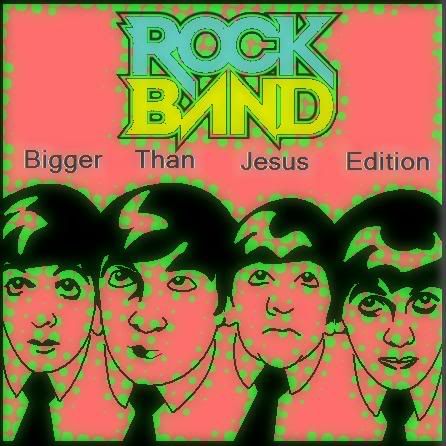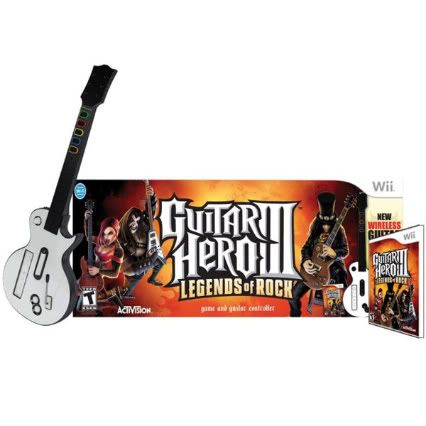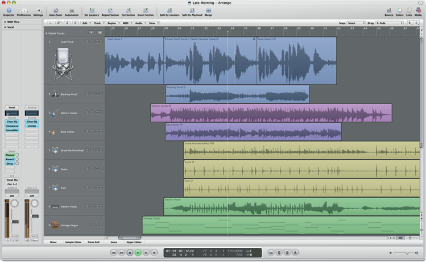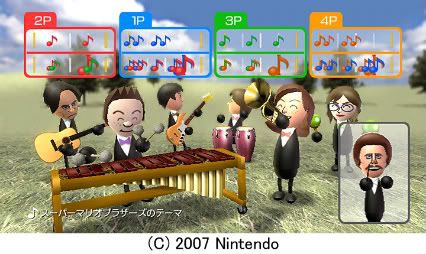
It’s clear that music games sell. Even WiiMusic. The reason why they sell is clear; people like music and they like it a lot!
However in recent years traditional music formats have not been selling. We have all read why, and normally those that comment and write about such matters immediately highlight illegal downloading and the fact that consumers are not willing to spend £1 on a single or £8 on an album.
I’m not going to dispute the effect piracy has had, and I could turn this article into a discussion on how the music industry made some awful short term decisions which helped devalue music and compound the effect of the digital download. Instead I’ll highlight how the music videogame is just the latest stage of how we have changed how we value music and justify purchasing it in the 21st century.
You see, whilst everyone was running about shouting about how music was devalued, or that no one was paying for it, a whole industry worth over a billion pounds came out of nowhere, where strangely enough people were paying £1.50 for a poor quality 30 second sample of a track to use as their ringtone! As you can see, that blows away the whole ‘people won’t pay for music’ argument. What did the industry learn from this experience? Answer: That people still love music and they will pay for it, even pay too much for it, as long as it’s relevant to another lifestyle experience.
Now I’m not suggesting that Ringtones led directly to Guitar Hero. Guitar Hero was a great game which inherited gameplay ideas from superb games such as Parappa the Rappa and the entire Dance Mat craze. However, I would suggest that it wasn’t until we saw the success of the ringtone that labels suddenly realised they needed to embed their product into someone else’s. It helped to establish the business model which Guitar Hero and Rock Band are thriving on.

It started off with a cheap plastic guitar accessory and now encompasses drums, guitars (possibly two), bass guitar and vocals. There are two main game franchises fighting for our attention in the guise of Guitar Hero and Rock Band. Having gone through a brief period where each system lacked interoperability, I believe that hardware from one can now be used with the other. Thank goodness.
These games sell, and they don’t just sell once but in effect many times over, as just like with ringtones many of their owners will regularly download songs and albums to their systems. As reported by Gamesindustry.biz, Michael Sportouch (head of Activisions Guitar Hero business): “we’ve sold 35 million games and we have a very active fanbase”
Consumers will pay good money to buy music which can only be used in the game and cannot be copied to their Ipod or phone and taken on the move with them. They are closed systems, but no one seems to mind. Why? Because it’s within the context of the game. Somehow it ‘feels’ different. Consumers have fought for no DRM on MP3s for years, and have won that battle. But for your music videogame no one seems to bat an eyelid!
Before I get a barrage of emails telling me why, I do realise that it’s more than just the music you download. Its the graphics and visual notation needed to ‘play the track’, and as each game is very different these can’t become interoperable. I get that. However why not make it that when you download one, you get the MP3 at the same time? With no DRM.
Guitar Hero has now taken the experience one step closer by not only offering tracks to play along to, but the ability to write your own and share them with the online community!
Similar to how Apple took over music retail overnight, with no history in the marketplace, so too video game developers and publishers are taking over music ‘production’ at a very basic level, leaving Yamaha, Roland and Steinberg (all traditional providers of hardware and software solutions for the music production market) out in the cold. Certainly, there is an argument that as these products are basic they will encourage people to migrate to more professional systems. I would agree with this, based on the current state of play.
However, how long till we see a Guitar Hero Pro? I think that the gap between the low end of the home production market and home consumer/entertainment market will shrink and converge.
Activision believes that their music products can become a platform in their own right, working off flash enabled TVs which are now coming to the marketplace at attractive prices. This would leave the consoles out of the loop and just as we already have online karaoke companies on the Web it would seem the next stage for these more complex music games is to go native on the net but accessed through our TVs.One company which is yet to enter this space but which must be looking at it with great interest is Apple. The company is known for music MP3 players and the best supported download store, but people also forget that this is the company that has a huge investment in music production and experience in taking it to the masses, via their products Garage Band and Logic Studio.

I’ve been predicting/hoping for a while that their possible Tablet device’s killer app maybe a touch screen version of Garage Band which allows realtime loop based arrangements and possibly DJ Hero style interaction. The technology is already there, and people are experimenting with similar tech on the Iphone/Itouch. Certainly though, if Apple decides that it wants a way into the video game market beyond their apps on the Iphone/Itouch it could be music and the gaming side of it which they use as a killer USP.

Additionally, it will be very interesting to see what Natal could bring to this experience and Nintendo’s replacement for the Wii (due 2011?). Certainly if the console manufacturers want to avoid the current players taking their products direct to the TV or Apple coming in and shaking things up I think they will need to make their unique controllers have an impact on the depth of experience. Certainly Nintendo tried this with their Wii Music which, if nothing else, was an interesting experiment at making a music game which did not follow the Guitar Hero route which all others have so far adopted.
So where are we heading with this? Well, at present it is a terrific platform at selling music for the labels. Artists’ old albums and new are being given a new lease of life and a dedicated marketplace in which to flourish. Im sure this will underpin the experience for many years to come, whether it be in current game play experiences or future gaming platforms. People like to hear music they already know, even if they change and modify it. Additionally not everyone is musical enough to create their own tunes from scratch.
Yet, there is no avoiding it; music is becoming more and more about creation and sharing. Its almost as if we are going back to how music was experienced before the advent of recording and the large music industry.
Indeed, perhaps in 20 years no one will be able to ‘name that tune’ as there will be just far too many!
Art R. Furie; Words Steven G


Comments